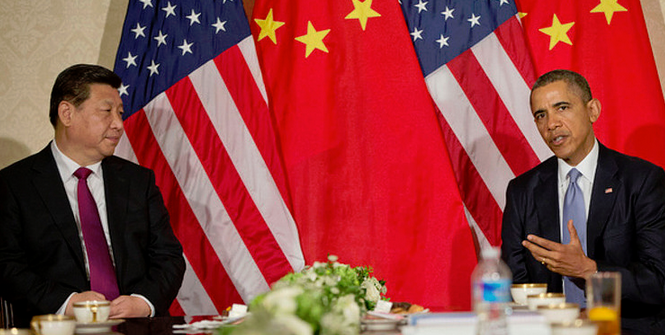AIIB: a Test of Sino-US Relations

It was announced during a meeting of the Asian Infrastructure Investment Bank (AIIB) in Singapore last weekend, that 20 more states will join the development bank. Washington, however, remains reluctant.
What does the AIIB mean for the US, China and the world? The AIIB joins together 50 states which include many long-term allies of the US, such as Britain, Germany, Australia, South Korea and Israel. There are three questions worth asking about the AIIB: what exactly is the AIIB and its vision; how is Washington’s initial opposition evolving; and what is the foreign policy implication for Washington, Beijing and the wider world?
The AIIB
AIIB, a Chinese-led initiative begun in October 2013, aims to form a new international financial institution to meet the demand for infrastructure investment in Asia. Its foundation document was signed by 20 founding members in 2014 and outlined the AIIB’s basic vision. Countries’ GDP is used as the basis of individual states’ share in the AIIB, so that their share, and consequent voting right, may reflect each country’s development. Such design is obviously drawing on lessons learned from the World Bank and the International Monetary Fund (IMF), in which voting shares is relatively rigid and no longer reflective of the economic power balance in the world. In addition, 75 percent of the AIIB’s voting power will be held by Asian states, with the other 25 percent held by states outside of Asia. Initially, China’s share of the voting power was around 50 percent. The AIIB is not only a tool for China to expand its influence, it is also digests some of China’s $3.8 trillion foreign currency reserve.
A Referendum on US Foreign Policy
The emergence of China as an international lender is nothing novel. In 2009, Chinese Banks including the China Development Bank and China Eximbank, superseded the World Bank and the IMF as the largest lender to developing world. China’s search for alternative international institutions is not new either; hosting the conferences for Interaction and Confidence-Building Measures in Asia (CICA) and BRICS New Bank are just two among many examples. Ironically, without US objection to it, the AIIB would be another emerging institution that is unfamiliar to the public debate. Rather, the failure of Washington in dissuading its traditional allies makes the AIIB a “propaganda victory” for China.
Joining the AIIB became a referendum on US foreign policy. As the US is seemingly hostile to such Chinese initiatives, it has tried to dissuade its allies from joining. Notably, a White House official defined UK entry to AIIB as a ‘constant accommodation’ of China. However by June, the AIIB has been joined by all BRIC countries, four permanent members of the United Nations Security Council (except the US) and four of the G7 members. The AIIB now includes most of the US’ major allies in Europe and Asia, such as the UK, France, Germany, South Korea, Australia and even Israel. The expansion of AIIB membership in March left the US and Japan as the only two major economies that have not applied to join the AIIB.
Implications for the Washington:
As most US allies abandoned opposition of the AIIB, the US found its attempt to “isolate” China turning into “self-isolation”. Hence, it was prudent for Washington to change its strategy based on the new international context. As argued in a National Interest article, it is obvious that by late March the most rational damage-control measure the Obama administration could take was to participate in the AIIB project.
But why did Washington not join the AIIB after all? The answer lies in US domestic politics. Such an option was constrained by Republican control over Congress. For the US to join the AIIB, it has to make billions of dollars of capital contribution; such funding would never be approved by the Republican-dominated Congress. Given President Obama’s fights with Republicans on several foreign policy issues, such as the recent approval of the nuclear agreement, there was less political capital to spare for the AIIB. In addition, US domestic politics on China is increasely security-centric and confrontational, for example on issues such as cyber-security. The general deterioration of the public perception of Sino-US security relations makes it difficult for the two nations to cooperate on economic issues.
Implications for China
Unexpected expansion of the AIIB is not necessarily all rosy for China either; Western participation constrains the capacity for the AIIB to be China’s foreign policy instrument. For example, China’s original plan to have a 50 percent voting share was diluted by the entry of new member states. In other words, the joining of AIIB by US allies has created a public relations triumph for China while also constraining Beijing’s clout over the AIIB. As Nathan Sheet, US Treasury undersecretary, advocated, Western powers inside AIIB might try to shape AIIB to conform with Western standards. Western states in the AIIB in particular would be likely to push for interference in states’ domestic governance issues and labor standards – agendas that contradict what is conventionally seen as a non-interventionist “China model” in development. But for the moment, it seems that Beijing is utilizing the international nature of the AIIB as a testing ground for a new kind of China-led International Institution. On 19th of September, the president-elect of the AIIB, Jin Liqun declared that the ‘AIIB will be a good global citizen’ which will ‘focus on transparency, openness, independence and accountability.’ Despite short term constraints, a more internationalised AIIB is probably conducive in the long-term for China; this is in terms of optimising its development institutions using Western experiences in addressing environmental and governance issues in development.
A Complementary Competition
At the end of the day, the competition between China’s AIIB and traditional international financial institutions might be a healthy and complementary one. Despite apparent political competition, Western and Chinese institutions can provide different solutions according to respective norms: either the nonintervention, business model of China, or the more Washington consensus-based, democracy-promoting, human-rights sensitive approach of the US. As history indicates, international development policy will always involve geopolitical competitions. However, one thing is certain: the AIIB as an additional pool of credit is definitely a positive change for the economic development of Asia.
Xunchao Zhang is an international affairs observer, sub-editor of ACYA Journal of Australia-China Affairs as well as a member of the Center for International Maritime Security (CIMSEC). He is currently an intern at AIIA National Office. This article can be republished with attribution under a Creative Commons Licence.




